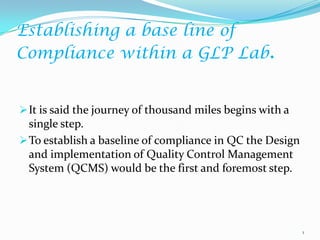
QCMS
- 1. Establishing a base line of Compliance within a GLP Lab. It is said the journey of thousand miles begins with a single step. To establish a baseline of compliance in QC the Design and implementation of Quality Control Management System (QCMS) would be the first and foremost step. 1
- 2. Establishing a base line of Compliance within a GLP Lab. For a new organization the QCMS has to be designed and implemented as per the regulatory requirements which are applicable like USFDA / MHRA etc. For an existing organization GAP analysis needs to be done between the existing facility and the QCMS desired. 2
- 3. Establishing a base line of Compliance within a GLP Lab. Compliance: Conformance to the specification or predefined standards. Following the standardized procedures and documenting accurately and concurrently what is done. Do what is written / described, write / report what is done. Compliance is a very broad term which applies for each and every activity in QC. But how it is to be implemented is very specific for each section. 3
- 4. Establishing a base line of Compliance within a GLP Lab. Quality Control Laboratory generally has the following sections: Raw Material In process Finished Product Stability Validation Good Laboratory Practices (GLP) / Analytical Assurance Microbiology Documentation 4
- 5. Establishing a base line of Compliance within a GLP Lab. Compliance for RM, PM & FP section is: Receiving the GRN / TRN, logging in the A.R.No. log, sampling for RM and FP sample receipt from IPQA. Sample allocation and worksheet issuance by the section head to the respective chemist. Testing as per the Protocol of Analysis. Documentation as per the worksheet. Review of raw data and related entries by the section in charge. Approval / Rejection (Disposition) by QC Manager. Retention / Control sample storage. Archival of the reports. 5
- 6. Establishing a base line of Compliance within a GLP Lab. Compliance for Validation Section is: Method Validation: Analytical / Microbial Method Validation to be carried out as per the pre-approved protocol as per ICH guidelines (ICH Q2). Cleaning Validation: Swab, rinse, CIP, sampling and testing as per the approved protocol. Process Validation: Prospective, concurrent and retrospective validation samples to be tested as per validation protocol. Instrument Validation: Analytical Instrument Qualification- DQ,IQ,OQ&PQ. Analyst validation / Qualification: New comer & periodic. Computer System Validation. 6
- 7. Establishing a base line of Compliance within a GLP Lab. Compliance for GLP Section is: Calibrations as per Calibration Schedule. Preventive Maintenance as per PM Schedule. Training as per the training needs matrix. Working standards and reference standards management. User administration (21 CFR Compliance). Data back up and restoration (Disaster mitigation). Chromatographic column management (HPLC / GC) Chemical / reagents receipt, storage and consumption. Issuance- Log books, Worksheets, calibration formats. OOS, change management and deviation handling. 7
- 8. Establishing a base line of Compliance within a GLP Lab. Non compliance in QC may be due to the following commonly known reasons: Measurement System Variation. Instrument breakdowns Lack of training Improper standardization Calibration failures Lack of precision Improper reagent quality Utility failure Sampling error Testing error conti……. 8
- 9. Establishing a base line of Compliance within a GLP Lab. Improper storage Visual error Washing problems and carryovers Improper column maintenance Power failures Software related problems Sterility failures Documentation errors. 9
- 10. Establishing a base line of Compliance within a GLP Lab. The baseline of compliance can be established by: Recruiting the right people (appropriate technical qualification and experience) to perform the task. Describing the job to be done by each one (job description) Identifying the training needs and training the personnel for the specific task. Providing adequate resources like instruments, standards, reagents etc for testing. Establishing Written Procedures (SOPs and General Procedures) for every task. Ensuring that the testing has been conducted by well trained qualified chemists as per the approved protocol and validated method with proper documentation using calibrated instruments and valid standards & reagents. Conti………. 10
- 11. Establishing a base line of Compliance within a GLP Lab. Quality Control Management System (QCMS) can be effectively implemented by assigning the project to the core team. The Project Manager should assign the core team the schedule and deadline for GAP analysis and QCMS implementation. The core team should perform the GAP analysis, prepare a project report and discuss the mitigation plan. The management should provide the resources required for establishing the baseline for compliance. Compliance should be done and QCMS should be in place and in use thus making the site ready for regulatory audits. Compliance is a continuous process and should be maintained and continuously improved for long term / throughout product life cycle assurance of quality. 11
